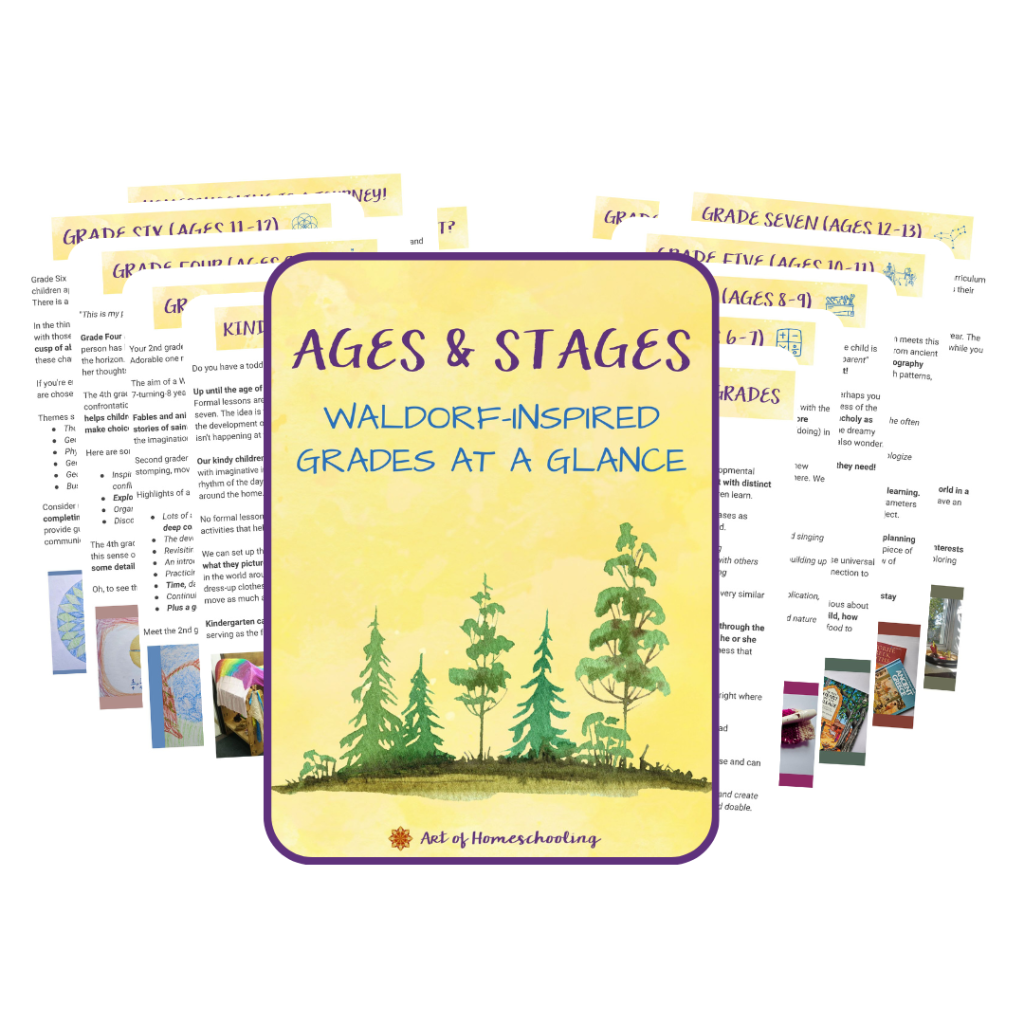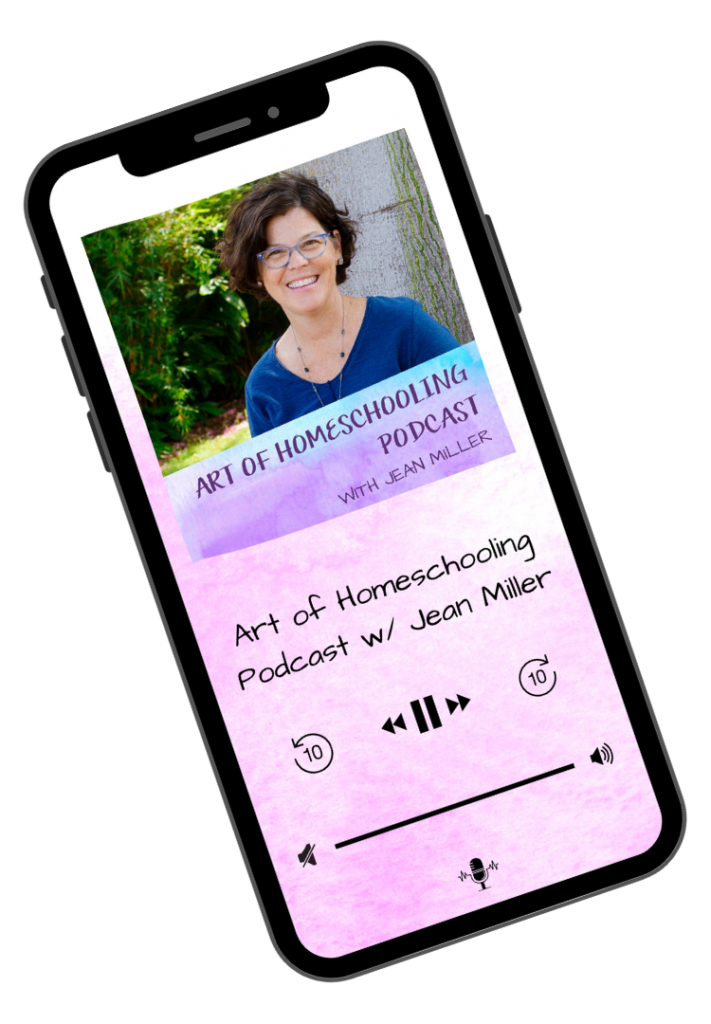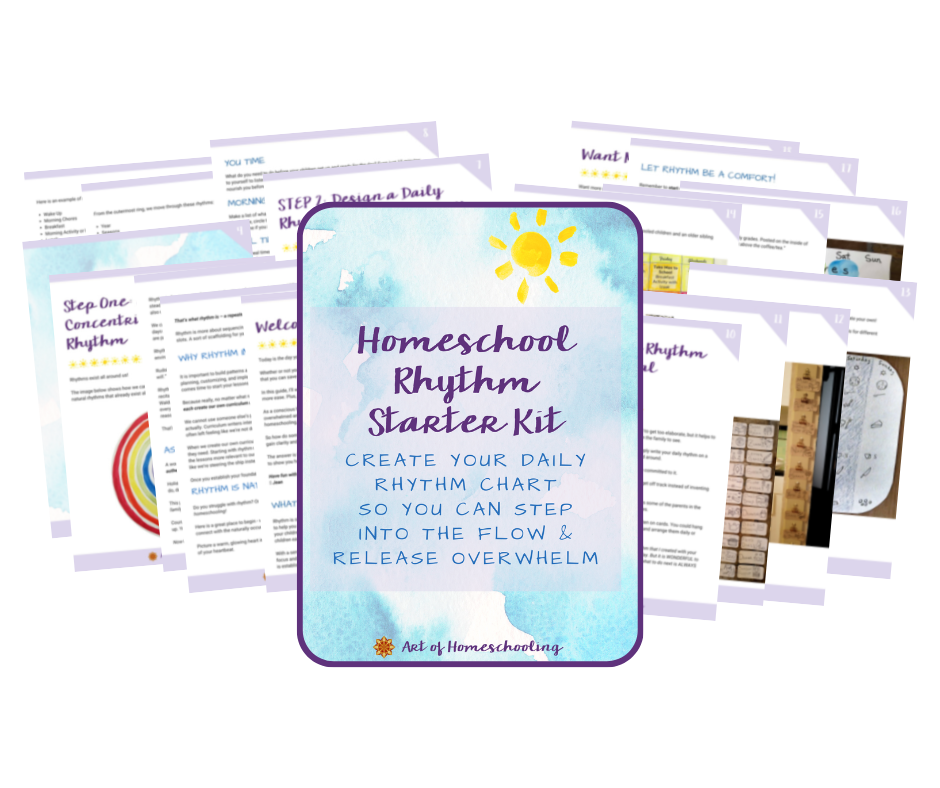Episode 204
As I was preparing this podcast episode all about homeschooling sixth grade, what came to mind was that the sixth grade topics may seem a little bit dry…at first.
Literally! Geology, rocks and minerals, and the Roman Empire!
You might remember from your own school years things like memorizing dates, labeling maps, and copying definitions.
However, the sixth grade topics are anything but boring when experienced through the lively arts and stories. Stories that highlight historical figures, discoveries, and events that changed the world.
A Waldorf-inspired approach to homeschooling sixth grade can help us navigate the growth and development of the twelve year old. Sixth graders are just on the cusp of abstract thinking. This is a year to really focus on the balance of thinking, feeling, and willing.
So in this episode of the Art of Homeschooling podcast, you’ll find ideas, resources, supplies, and insights to support and inspire your teaching of grade six.
In the show notes below are links and highlights from the episode.
Lively Teaching for the Sixth Grade Year
Grade Six is a year when teaching may change significantly in your homeschool. As children approach adolescence, they take a firm, intentional step out into the world. There is a greater orientation with gravity and cause and effect.
How does the curriculum match children developmentally? One example is the study of geology. Metaphorically, mountains, rocks, and minerals are the bones of the earth and give structure to the land just as our bones and skeleton give structure to our bodies.
To keep this topic from becoming abstract and dry, we can draw on the Waldorf approach to teaching science known as the “phenomenological approach.” For the science subjects, this refers to observing phenomenon first, before hypothesizing or drawing conclusions ~ just like a true scientist would.
The goal of a phenomenological approach to teaching is to focus on an individual’s first-hand experiences rather than the abstract experiences of others.
We can also keep our teaching of subjects like history lively with the idea of the phenomenological approach. With history, for example, rather than studying about different time periods, we can immerse ourselves into history through direct experience ~ reading stories, visiting museums, role-playing different historical figures.
The Waldorf approach to teaching history can also be distinguished as an “episodic approach” to history. This refers to studying history by focusing on individual, distinct events or “episodes” rather than analyzing broader trends or long-term developments.
My friend Alison likes to say, “we want to “drop in” to fascinating moments in history.
Essentially, we’re treating history as a collection of separate stories with a focus on key moments and turning points. It’s like looking at history through a series of snapshots rather than one continuous film.
In sixth grade, we bring stories of ancient civilizations like Rome in which everything was highly structured, which matches the child’s more systematic and analytic way of thinking.
Even with these weighty subjects like geology and Roman history, we want to continue bringing as much hands-on experience as possible to the learning!
Homeschooling Sixth Grade
If you’re embarking on Grade Six this year, know that the themes explored in this grade are chosen expressly to assist both the inner and outer questing of the young person. They meet the child where they are developmentally as they grow.
Here are some possible themes and topics:
- The rise and fall of the Roman Empire
- Geology & mineralogy
- Physics
- Geography of the world
- Geometric drawing with straightedge & compass
- Business math, decimals, & percents
Here’s something to keep in mind when considering main lesson block topics for homeschooling sixth grade. Much of what we’re familiar with for each grade are what’s become custom in Waldorf schools. But remember, we get to choose. There is a lot more variation in block topics from grade 5 and up even in traditional Waldorf settings.
Rudolf Steiner, the founder of Waldorf education, didn’t lay out the curriculum in this much detail really. So you get to look at YOUR sixth grader and choose topics of study for your family. There’s room for choice here.
To hear more about what’s become custom or dogmatic in Waldorf education, please go find Episode #200: Ditching the Dogma, in which I share a wonderful conversation with Robyn Beaufoy of Waldorfish all about letting go of dogma in our teaching.
Teaching Strategies for Sixth Grade
As a teaching strategy, consider making your focus the creating and sharing of academic experiences and completing academic challenges.
This really changed homeschooling for me and made it so much more fun and interesting. Around grade five or six, my kiddos could consider what kinds of projects they wanted to do to share about what they were learning and make choices about what they wanted to explore further related to our main lesson topics.
You create the structure (with your child’s input) and provide guidance, while your child does the research, makes the observations, and communicates their reflections and conclusions in some form.
“The children in Grade 6 are demanding to be recognized in a different way from before. They no longer want everything to be ‘beautiful’. Actually they feel capable of coming to their own conclusions, of making their own decisions. They want to be able to solve real problems, to organize their own schedules and projects, to work out the ground rules … They want to be challenged mentally and allowed to work things out for themselves!”
~Child Development Manual from the East African Waldorf Teacher Development Program
Resources & Supplies for Your Sixth Grade Basket
Now for some resources and supplies for homeschooling sixth grade!
Some of the links below are my referral links which simply means that I may earn a commission from products you purchase via my links at no additional cost to you. You can read my full disclosure policy here.
- The Crust of Our Earth: An Armchair Traveler’s Guide by Chet Ramo
- Augustus Caesar’s World by Genevieve Foster
- String, Straightedge, and Shadow: The Story of Geometry by Julia E. Diggins
- Your Business Math from Simply Charlotte Mason
- Compass & straightedge for geometry
- Collection of rock specimens
- Field guide to rocks and minerals
- Supplies for charcoal drawing
Links & Resources
These were mentioned in the episode!
- Child Development, Written for The East African Waldorf Teacher Development Program by Peter Van Alphen & Catherine Van Alphen
- More about the phenomenological approach to teaching science here in Episode #171 ~ Nature Study: The Foundation of Science.
- If you want to hear more about the stages of child development, be sure to have a listen to Episode #126 ~ Thinking, Feeling, Willing: 3 Ways Children Learn all about creating a meaningful learning process through intentional purposeful activity that meets children right where they are developmentally.
Navigating through the Ages and Stages of Waldorf-inspired Homeschooling
Find a ✨FREE✨ printable guide to the ages and stages of Waldorf-inspired homeschooling HERE!
The Ages & Stages Guide: Waldorf-Inspired Grades at a Glance is an invaluable resource for your homeschooling reference library! It offers highlights and main lesson topics from each grade, kindergarten through grade eight.
And don’t miss other episodes in this Ages & Stages series:
- Kindergarten ~ Episode 182: The Kindergarten Basket
- First Grade ~ Episode 185: The First Grade Basket
- Second Grade ~ Episode 187: The Second Grade Basket
- Third Grade ~ Episode 192: The Third Grade Basket
- Fourth Grade ~ Episode 197: The Fourth Grade Basket
- Fifth Grade ~ Episode 201: The Fifth Grade Basket
- Sixth Grade ~ Episode 204: The Sixth Grade Basket
- Seventh Grade ~ Episode 207: The Seventh Grade Basket
- Eighth Grade ~ Episode 210: The Eighth Grade Basket
Until next time!💜

Rate & Review the Podcast
If the Art of Homeschooling Podcast has inspired you, I’d LOVE it if you could rate and review the podcast on your favorite podcast player! Reviews can be left on Apple Podcasts (iTunes), Podcast Addict, or Stitcher.
Or simply pop on over to lovethepodcast.com/artofhomeschooling and choose where you want to leave your review.
And if you want to show your appreciation for the Art of Homeschooling Podcast, you can buy me a cup of tea!
Never Miss an Episode!
Check Out All the Episodes





